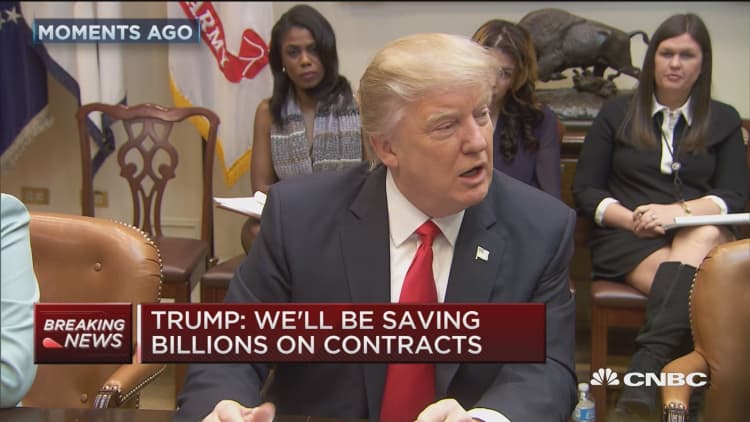President Donald Trump's plan to make pipeline builders use American materials would potentially lead to higher costs, production delays and canceled projects if implemented without substantial exceptions.
It would also force the industry to fundamentally retool its supply chain and expose companies to risks that come with relying on a single market for raw materials and equipment.
Requiring the nation's pipelines to be built and repaired with American-made pipes and raw steel has become a pet project for the president. It's become a regular fixture of his energy policy speeches, and Trump has threatened to withhold permits that companies need to lay pipe on federal land if they don't play ball.
This is not the '70s and '80s where you can say, Made in America and put an American flag on a t-shirt. The world is very different.Lisa Goldenbergpresident of Delaware Steel
But a group of six oil and gas associations warns the plan would disrupt established supply chains and send rising steel prices even higher. In some cases, American mills would simply be unable to meet the demand, they said.
"Relying solely on U.S. pipeline grade steel and pipe production could lead to long construction delays and higher costs, potentially canceling planned pipeline projects or blocking new pipeline projects," the associations said in comments to the U.S. Department of Commerce.
The organizations that contributed to the dozens of pages of analysis, submitted as part of a request for comments by Commerce, include the American Petroleum Institute, the American Gas Association and the Association of Oil Pipelines.
The U.S. steel industry does not currently make the type of steel used in many pipelines, but it says it is ready, willing and able.
"We have all the necessary high-cost materials that would go into cost-effectively making steel, but we've got to have a leveled playing field to compete," Doug Matthews, senior vice president at U.S. Steel, told CNBC. "That's [why] we're excited about with the administration's push right now."
The oil and gas associations argue that the government may have to incentivize steel makers and manufacturers to make pipeline-quality steel and line pipes because they are "among the slowest, most expensive products for domestic mills to produce." Consequently, many mills would prefer to use their facilities to make less time- and cost-intensive products.
There are 40 to 50 mills that make line pipe for U.S. projects, about half of which are located in the United States, the trade groups estimate. When it comes to making large, technically sophisticated pipes, there are just a handful of American providers.
A boom in U.S. shale oil and gas production has driven an increase in construction of mills capable of churning out these products, but there are still only eight mills that make pipes with a diameter of 30 inches or larger. For pipes of that size that need to be a certain thickness, that number falls to three. No American mills make pipes of the highest grade, size and thickness.
The few mills capable of making these pipes would be further taxed by Trump's insistence that manufacturers also use raw steel made in the U.S.
More than half of the steel plate and coil used to make these pipes is imported. Limiting imports of these inputs would actually hamper the ability of mills to manufacture pipes for U.S. projects, the groups said.
"A decrease in the availability, or increase in cost, of these imported steel products could impact the production capabilities and economics of these domestic pipe mills, which could ultimately impact the steelworkers employed at these domestic facilities," they said.
The companies that make valves and other equipment for pipelines also import parts for assembly in the United States. They say it could take years to build the facilities to make those parts at home, a process that could increase prices for valves by 75 to 150 percent.
"This is not the '70s and '80s where you can say, Made in America and put an American flag on a T-shirt. The world is very different," said Lisa Goldenberg, president of Delaware Steel, a trading and processing firm.
"The whole idea of Made in America in a global universe is a tricky one," the former president of the Association of Steel Distributors told CNBC.

To be sure, pipeline companies and the associations that represent them have an interest in maintaining access to cheap foreign markets. Steel tariffs meant to dissuade dumping have sent prices rising for American manufacturers, with U.S. hot-rolled coil steel prices jumping 61.9 percent last year, FactSet data shows.
However, cost is not the only consideration. Buying pipe from a number of suppliers in different markets also allows manufacturers to reduce the risk of disruptions, Goldenberg said.
Those risks include production delays, worker strikes, loss or damage of supplies in transit and the chance that pipes don't meet quality standards.
A Made in America requirement would also create huge new costs for pipeline makers who have entered into contracts with suppliers for future projects and companies that are sitting on stockpiles of pipe. The oil and gas associations say an exception should be carved out in these cases.
Trump has already backed off his promise to make TransCanada use U.S. steel in its 1,200-mile Keystone XL pipeline. Much of the pipe had already been purchased and is sitting idle in a plant in Arkansas.
The oil and gas associations also suggested that exceptions be granted when a foreign company is the only supplier able to provide supplies in a timely manner, or when the requirement would raise the project cost by a pre-determined percentage.
The groups also recommend a phase-in period for procurement requirements.
Given the many constraints within the U.S. steel industry and price impacts laid out by the associations, exceptions like those could let many projects skirt the requirement for at least the next few years.
— CNBC's Jackie DeAngelis contributed to this report.


